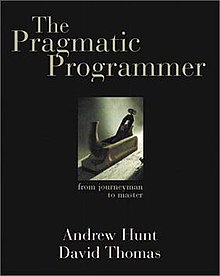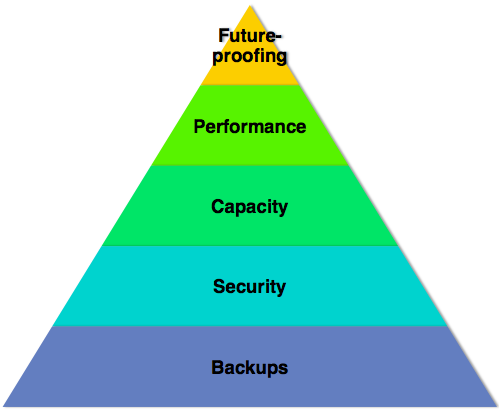 I'm a big fan of Andy Hunt and David Thomas's Pragmatic Programmer (2000) and the series of books they publish at the Pragmatic Bookshelf. You might think this is because I wrote my dissertation on John Dewey, a famous member of a group of philosophers called the American Pragmatists. To be sure, philosophical pragmatism has a lot in common with what we commonly mean by the word "pragmatic." For instance, the Pragmatists thought traditional philosophical questions were abstracted from the problems they were really meant to solve. Philosophers asked "What is the beautiful?" without working with artists who were trying to make more beautiful art. They asked "What is the good?" apart from the moral dilemmas of actual people. And they tried to define "What is truth?" in abstraction from rival truth claims.
I'm a big fan of Andy Hunt and David Thomas's Pragmatic Programmer (2000) and the series of books they publish at the Pragmatic Bookshelf. You might think this is because I wrote my dissertation on John Dewey, a famous member of a group of philosophers called the American Pragmatists. To be sure, philosophical pragmatism has a lot in common with what we commonly mean by the word "pragmatic." For instance, the Pragmatists thought traditional philosophical questions were abstracted from the problems they were really meant to solve. Philosophers asked "What is the beautiful?" without working with artists who were trying to make more beautiful art. They asked "What is the good?" apart from the moral dilemmas of actual people. And they tried to define "What is truth?" in abstraction from rival truth claims.In short, philosophical pragmatism eschews head-in-the-clouds questions and focuses on solving problems. Any reflection that is not grounded in solving a problem risks being disconnected from practical consequences. It might even make us worse at solving problems by narrowing our thinking by theories that are untested by experience.
Though there are dangers to pure theory, I find most technical books (and blogs) to slide too far to the other side of the spectrum between theory and practice. These books are often written in the form: "If you want to do X, do Y." If you want to build an index on a table, here is the command. If you want to inherit one class from another, use this syntax. If you want to create a web service, you must create this kind of a connection. Such books are often so focused on the trees that you never see the forest. They are pragmatic in the sense that they don't give you a bunch of high-falutin' theory that you'll never use, but they aren't really pragmatic in the sense of helping you solve real-world problems.
Why is that? Technical books are often useless because they assume you know what the problem is, and anyone involved in software development for long knows that this is rarely the case. If I know that I need to create an index on a table, I can read a tutorial on creating indexes. But maybe what I really need is to write better queries. Or perhaps I need to normalize my table architecture and make more use of clustered indexes rather than throwing non-clustered indexes at performance problems. I might be using a relational database when I should be using a document store. It could be that my company's code review process needs to be improved so that issues like this are handled by database programmers and not our support staff. Perhaps performance isn't even what I should be worrying about, and the biggest problem facing my company is writing more robust code. Once you start to delve into even the simplest of problems, you can open a Pandora's box of other questions that change your understanding of the matter at hand. The reason I like the pragmatic programming books is that they go beyond the nut-and-bolts approach and provide us with concepts to help us better prioritize and deal with the problems we actually face. In an ideal world, everyone would write perfect code. But in the real world, we are always in the process of improvement, and we need conceptual tools to determine what is most in need of improving.
 One of the best recent examples I've seen of the kind of truly pragmatic conceptual tools I'm talking about is Brent Ozar's hierarchy of database needs. We all know that our databases could be more secure, robust, and responsive, but what should we focus on now? Well, if we aren't backing them up, we need to create a maintenance plan ASAP. Then we can worry about security, and so on. The point here is not that Ozar's hierarchy is perfect. As he himself says, the problem with doing backups isn't that we don't know we should be doing backups (I hope); the real problem is that the technology and business groups haven't worked together to prioritize what is most important. And a major cause of such a communication breakdown is the lack of a vocabulary to describe the problem the teams face.
One of the best recent examples I've seen of the kind of truly pragmatic conceptual tools I'm talking about is Brent Ozar's hierarchy of database needs. We all know that our databases could be more secure, robust, and responsive, but what should we focus on now? Well, if we aren't backing them up, we need to create a maintenance plan ASAP. Then we can worry about security, and so on. The point here is not that Ozar's hierarchy is perfect. As he himself says, the problem with doing backups isn't that we don't know we should be doing backups (I hope); the real problem is that the technology and business groups haven't worked together to prioritize what is most important. And a major cause of such a communication breakdown is the lack of a vocabulary to describe the problem the teams face.I haven't seen a hierarchy of generalized software development needs, but Hunt and Thomas provide many tools to help you and your team develop your own. The base of the pyramid might be having a version control system, and then a ticketing system could come next. In the middle we'd want to make sure our code is orthogonal, or highly de-coupled. Finally at the top we could turn to documentation. Priorities will vary from place to place and from time to time, but without a language to talk about them, we cannot intelligently decide what to do next.

Hey Zach, today I was thinking about a line from your post which was probably throw-away: "In an ideal world, everyone would write perfect code". I wonder what "perfect code" entails from your perspective (as a programmer or philosopher!), if the goal of "improvement" is to move towards this state. It seems to me that assigning a value to code quality would involve some objective function with variables in the areas of maintainability (comments, organization, extensibility), performance (speed, efficiency, scalability) and cost, with corresponding weights that are project-specific (functions of users', managers', and code maintainers' expectations). I guess the "ideal world" would include a perfect knowledge of all the weights and the "perfect code" would be the point that "extremizes" the objective function? I wonder how we should measure "improvement" without knowing this function, except in a local sense?
ReplyDeleteExcellent question! That line was actually meant to be a bit sarcastic, because many programmers have some vague ideal of code--the way they code!--by which they measure everything else. I probably should have put "perfect" in scare-quotes. I think you're right that the evaluation of code can only be local or project-specific. We can measure certain aspects of code objectively. For instance, we can look at performance indicators or the time we spend debugging or the time it takes users to learn the application. But the choice of which values to prioritize requires a decision-making process like the one I mention in my post. It's all about communication--between business, technology, support, customers, etc. Maybe I'll write a post about perfection!
ReplyDeleteBy the way, one of the tenets of the Pragmatic Programmer is: You Can't Write Perfect Software.